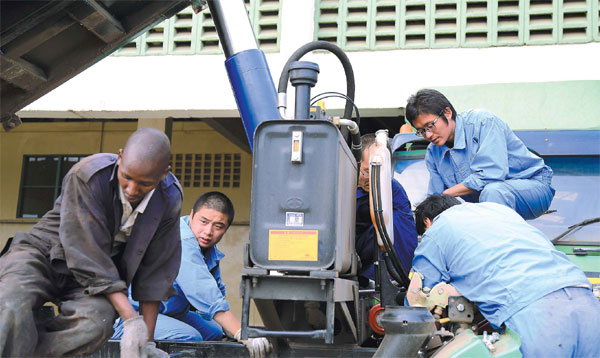Engineers break down learning barriers
By Hou Liqiang in Nairobi (China Daily Africa) Updated: 2015-01-16 11:04
Ren Dongshuai, right, repairs a truck with his colleagues at the National Youth Service in Nairobi. Weldon Ngetich, left, is learning from the team. Hou Liqiang / China Daily

Chinese trainers overcome language and culture challenges to transfer knowledge to Kenyan workers
Chinese engineers are overcoming obstacles of language and culture to help build a Kenyan team to work independently in the use and maintenance of Chinese engineering machinery.
At the National Youth Service in Nairobi, about 20 Chinese engineers and technicians from 12 Chinese companies are working as trainers or after-sales personnel, training NYS members on the use and maintenance of almost 300 sets of equipment, including heavy machinery and trucks, from China.
NYS is a Kenyan governmental program, dating back to 1964, to train youths in important national projects and teach them skills. Once compulsory, the program is now voluntary.
Among the engineers is Ren Dongshuai from Shaanxi Automobile Group. Though he arrived in Nairobi on Sept 16, he had been preparing for the assignment for more than a year.
While holding down his regular day job, the 25-year-old had had to take part in English classes every weekend to improve his English communication skills. "In about one year, I attended more than 200 English classes on weekends," he says.
But the year of preparation in English didn't mean he could start his job training NYS members immediately after coming to Kenya. Ren spent more than a month preparing his classes on theory after he came to Nairobi, even though he only had to give 18 40-minute classes in two days. Ren, whose field is transportation, had some difficulty with the translation of technical words and had to turn frequently to the dictionary.
Ren says the language is not as much trouble for him as the students' lack of basic knowledge of dynamics, which sometimes was of great concern to him. A heavy truck is not like small vehicles that you can start and drive immediately. It requires time for the truck's air pressure to reach a certain degree, says Ren.
"It relies on pressure to operate the brakes. If the air pressure is not high enough, you may be unable to stop it, making it quite dangerous," Ren added.
The company's machines have been used in construction of various infrastructure projects around the country. So another job for Ren is to perform inspection tours at construction sites to see if the machines are being used correctly.
Once when Ren was at a construction site in Kibera, the largest slum in the country, he was told that a dump truck wouldn't start. After checking the truck, he found that a screw near the engine had become loose, causing damage to some parts.
"The screw came loose from the vibration of the engine. But if drivers checked the machine regularly, they would be able to find the loose screw and fix it to avoid the damage," says Ren.
Ren says that unlike Chinese, Kenyans think it's the engineer's responsibility to check the machine. However, the shortage of engineers meant the machine could be checked only once in almost half a month, causing some small problems that could have been avoided to immediately become worse.
Ren's leader, Zhang Fuchun, doesn't speak English, but that doesn't prevent him from being a diligent teacher.
"Every morning, I stand at the gate to inspect machinery that will be driven out for work. Once I find something that's malfunctioning, I stop the driver and take away the ignition key, giving it back only after the fault is corrected," says Zhang. The 47-year-old says he can judge when something isn't working correctly based on the noise from the machinery, even if it is several meters away.
Zhang says they are determined to train a team of workers who know how to correctly use and maintain the machines after two years of training.
"I have been to two other countries on similar missions and all of them have been successful. Though it's difficult here in Kenya, I must see it through. When I am old, I can tell my grandchildren proudly that I have apprentices in Africa as well," says Zhang.
Ren and Zhang are working through a project sponsored by Beijing-based AVIC International Holding Corp that aims to build a skill training system all across Kenya. The large company is the subsidiary of the Aviation Industry Corp of China, which is involved in international aviation, trade and logistics, electronic high technology and many other fields
In February 2012, AVIC signed a contract of about $70 million with Kenya's government. With a concessional loan from the Chinese government, NYS managed to import about 300 sets of equipment from China.
The equipment will be distributed to 47 counties in Kenya and AVIC will be responsible for building training and maintenance centers all around the country.
This is AVIC's second such cooperation with NYS, the first being in December 2007 for about $56 million. With the support of the Chinese government, NYS imported more than 251 sets of equipment from China.
"With other countries, you first get the machines and then you struggle on your own to learn to work with them. There are no guarantees," says Beatrice Oyori, senior deputy director of social transformation and vocational training at NYS. She says the extensive training makes the partnership with China different.
"The training you are providing is very key. We really appreciate it. The talent (we get) doesn't die. It can be handed over to the next generation. Those mechanics trained by engineers from China will train other ones. So it is very encouraging," says Oyori.
houliqiang@chinadaily.com.cn
(China Daily Africa Weekly 01/16/2015 page8)
 Overhauling China's organ transplant system could take some time
Overhauling China's organ transplant system could take some time
Overhauling China's organ transplant system could take some time





